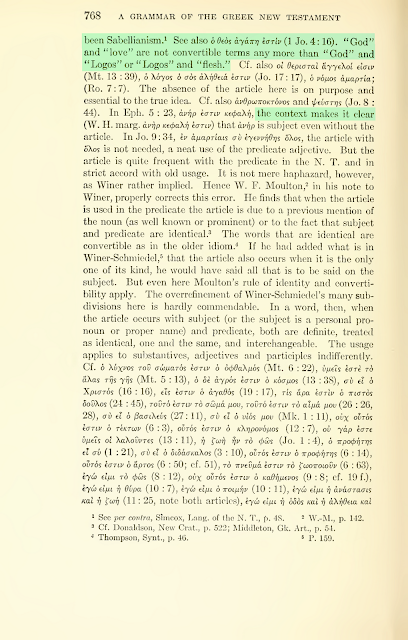The third statement, "The Word was God," is especially significant. This is a clear statement of deity inasmuch as the noun θεός (theos, "God") is anarthrous; that is, it lacks the article. Much confusion has spawned over this point of Gr. grammar. Robertson et al. have aptly demonstrated that the lack of the article in the predicate is intentional so that the subject can be distinguished. In other words, in the phrase θεὸς ἦν ὁ λόγος (theos en ho logos, "God was the Word"), were it not for the article ὁ (ho) before the word λόγος (logos), the subject of the phrase would be indeterminate. But the presence of the article shows that it is the "Word" that is the subject. The fact that theos is a predicate shows that it is describing the nature of the Word; he is of the same nature and essence as the noun in the predicate; that is, the Word is divine (RHG, p. 767).E.C. Colwell says that "a predicate nominative which precedes the verb cannot be translated as an indefinite or 'qualitative' noun solely because of the absence of the article; if the context suggests that the predicate is definite, it should be translated as a definite noun in spite of the absence of the article. In the case of a predicate noun which follows the verb the reverse is true; the absence of the article in this position is a much more reliable indication that the noun is indefinite" ("A Definite Rule for the Use of the Article in the Greek New Testament," JBL 52 [1933]: 20-21).To say that the absence of the article bespeaks of the nonabsolute deity of the Word is sheer folly. There are many places in this Gospel where the anarthrous theos appears (e.g., 1:6, 12, 13, 18), and not once is the implication that this is referring to just "a god."
Η τρίτη δήλωση, «Ο Λόγος ήταν Θεός», είναι ιδιαίτερα σημαντική. Αυτή αποτελεί σαφή δήλωση της θεϊκότητας αφού το ουσιαστικό θεός είναι άναρθρο· δηλαδή, του λείπει το άρθρο. Πολύ σύγχυση προκλήθηκε για αυτό το σημείο της ελληνικής γραμματικής. Οι Robertson et al. επέδειξαν ορθά ότι η έλλειψη του άρθρου στο κατηγόρημα είναι εσκεμμένη ουτωσώστε το υποκείμενο να μπορεί να διακρίνεται. Με άλλα λόγια, στη φράση θεὸς ἦν ὁ λόγος («Θεός ήταν ο Λόγος»), αν δεν υπήρχε το άρθρο ὁ πριν τη λέξη λόγος, το υποκείμενο της φράσης θα ήταν απροσδιόριστο. Αλλά η παρουσία του άρθρο δείχνει ότι ο «Λόγος» είναι το υποκείμενο. Το γεγονός ότι η λέξη θεός είναι κατηγόρημα δείχνει ότι περιγράφει τη φύση του Λόγου· ότι είναι από την ίδια φύση και ουσία όπως το ουσιαστικό στο κατηγόρημα· δηλαδή, ότι ο Λόγος είναι θεϊκός. (RHG, p. 767)Ο E.C. Colwell αναφέρει ότι «το κατηγόρημα στην ονομαστική το οποίο προηγείται του ρήματος δεν μπορεί να μεταφραστεί ως αόριστο ή "ποιοτικό" ουσιαστικά μόνο εξαιτίας της απουσίας του άρθρου· αν το περικείμενο υποδεικνύει ότι το κατηγόρημα είναι οριστικό, θα πρέπει να μεταφραστεί ως οριστικό ουσιαστικό παρά την απουσία του άρθρου. Στην περίπτωση που το κατηγορηματικό ουσιαστικό ακολουθεί το ρήμα ισχύει το αντίστροφο· η απουσία του άρθρου σε αυτή τη θέση είναι πολύ πιο αξιόπιστη ένδειξη ότι το ουσιαστικό είναι αόριστο». ("A Definite Rule for the Use of the Article in the Greek New Testament" [«Συγκεκριμένος Κανόνας για τη Χρήση του Άρθρου στην Ελληνική Καινή Διαθήκη»], JBL 52 [1933]: 20-21).Το να πούμε ότι η απουσία του άρθρου υποδηλώνει τη μη απόλυτη θεϊκότητα του Λόγου είναι καθαρή παράνοια. Υπάρχουν πολλά σημεία σε αυτό το Ευαγγέλιο στα οποία η άναρθρη λέξη θεός εμφανίζεται (π.χ. 1:6, 12, 13, 18) και ούτε μία φορά δεν υπάρχει η υπόνοια ότι αναφέρεται απλώς σε «θεό».
Volume 9 (John-Acts)//Τόμος 9 (Ιωάννης-Πράξεις), Zondervan, 1981,p./σ. 29.
RHG, p. 767-769:
Archibald T. Robertson,
A grammar of the Greek New Testament
in the light of historical research
[Γραμματική της Ελληνικής Καινής Διαθήκης
στο φως της ιστορικής έρευνας] (RHG),
New York Hodder & Stoughton 1914.
[English/Αγγλικά, PDF]
A grammar of the Greek New Testament
in the light of historical research
[Γραμματική της Ελληνικής Καινής Διαθήκης
στο φως της ιστορικής έρευνας] (RHG),
New York Hodder & Stoughton 1914.
[English/Αγγλικά, PDF]




No comments:
Post a Comment